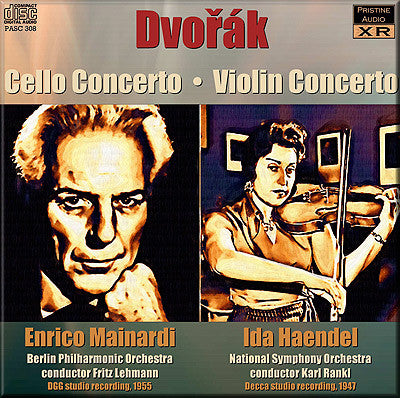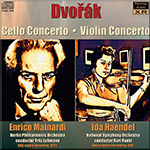
This album is included in the following sets:
This set contains the following albums:
- Producer's Note
- Full Track Listing
- Cover Art
Superb 32-bit XR remasters of the Dvořák string concertos
Mainardi and Haendel on top form for these excellent studio recordings
I had two LP copies of the Mainardi to work from - the original DGG issue and the mid-60s Heliodor fake-stereo reissue. In terms of surface quality and fidelity the later pressing was infinitely preferable to the original, in near mint condition and with superb sound quality. I was able to strip out the Heliodor stereo processing and remove any phasing artefacts prior to 32-bit XR remastering, which proved highly successful in bringing further treble clarity to the recording.
From the LP the recording was pitched at A=451Hz. However, analysis of mains electrical hum suggested a true tuning of A=450Hz and this has been used for the final remastered version. Likewise the Decca Haendel 78s transferred at around A=451Hz but electrical hum indicated a performance pitch of A=445Hz, which is what is heard here.
Decca's ffrr 78s date from the final months of direct-to-disc recording, prior to tape, and here indicate just how successful this method had become by 1947. The sound is clear, the frequency range well-extended, and with XR remastering little hint remains of the shellac origins of the concerto, which stands up very well in comparison to the cello recording.
Andrew Rose
Recorded 24 January 1955
Jesus Christus-Kirche, Berlin
First issued as DGG 18236
Transfer from Heliodor LP 89 520
Enrico Mainardi cello
Berlin Philharmonic Orchestra
Fritz Lehmann conductor
Recording producer: Victor Olaf
Recording Engineer: Kenneth Wilkinson
Recorded 30-31 July 1947
Kingsway Hall, London
First issued September 1948
Transfer from Decca 78s AK.1744-47
Matrix Nos: AR.11472-79
Takes 1, 1, 2, 2, 1, 2, 2, 2
Ida Haendel violin
The National Symphony Orchestra
Karl Rankl conductor
XR remastering by Andrew Rose at Pristine Audio, September 2011
Cover artwork based on photographs of Enrico Mainardi and Ida Haendel
Pristine Audio is grateful to Al Schlachtmeyer for the generous donation of the Haendel discs
Total duration: 69:00
MusicWeb International Review
Her playing of the finale’s folk incidents, and associated crisp chording, is a pleasure to hear
These two concerto performances make contrasting claims on the listener.
Ida Haendel’s 1947 recording of the Violin Concerto was made in
Kingsway Hall, accompanied by the pick-up National Symphony Orchestra
under Karl Rankl. This was composed of first-rate musicians, but they
didn’t always form a first rate orchestra. There are moments of rhythmic
uncertainty, and a slight feeling of under-engagement from time to time
which, whilst hardly an impediment to the soloist, means that the
recording as a whole is slightly less impressive than it might have
been. Haendel’s tone is quite fervent, but it’s well controlled, and
never seems out of scale - albeit her vibrato has a tendency to seem a
touch fast on occasion. Her phrasing is eloquent, maybe a touch
unidiomatic at a few paragraphal points, but her playing of the finale’s
folk incidents, and associated crisp chording, is a pleasure to hear.
Dutton issued this recording well over a decade ago, as part of an
all-Haendel disc - the Tchaikovsky with Basil Cameron was the other main
work. The transfers represent the divergent aesthetics of these two
labels - a somewhat dampened treble from Dutton, a more expansive top to
bottom range from Pristine.
I know two of Mainardi’s other
performances of the Concerto. I’ve reviewed the live one with Jochum on
Tahra 638-39; then there’s the wartime inscription with van Kempen and
the Staatskapelle Berlin, on 78s. On neither of these occasions has he
ever much impressed. He always started with a sluggish, wan, almost
sullen first entry, and things progressed from there. It may chart some
kind of emotive development for him, but it rather flies in the face of
the composer’s express markings He never had an especially beautiful
tone but he was always a tactful player, even if he is raspily-toned
here in places and his downward scale is ponderous. In fact Lehmann and
the orchestra prove to be luxury casting - outstanding winds, commanding
bass line - and rather upstage the dogged soloist. It’s telling that
one listens to little rhythmic emphases from Lehmann and to the
contributions from the orchestra’s principals with as much interest as
one does to the soloist. I do admire Mainardi - just not in this work.
Coupling historical performances like this makes some sense, but to
saddle a good performance of the Violin Concerto with a rather
(soloistically) nondescript one of the companion work will cause
problems for potential purchasers.
Jonathan Woolf

